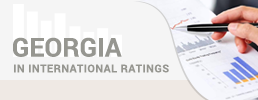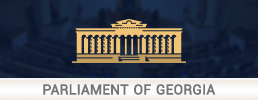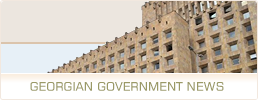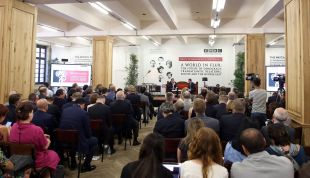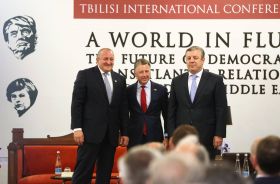2017-09-12
Kurt Volker: Thank you so much. I think we are honored that you would spend your time with us, as I know you have a full, full agenda of things to take care of. I would like to start by asking you as a kind of CEO of the Government here. What are your priorities right now as you look at Georgia's development, it economy, its democracy, its integration into Europe and NATO, challenges with Russia? How do you frame your priorities? What is on your to-do list?
Giorgi Kvirikashvili: Thank you very much, Kurt. I am very pleased to be here. I would like to thank the McCain Institute and EPRC for organizing this forum. I would like to also thank all the sponsors of this traditional forum, and I am very glad to be here to see friends of Georgia, some of them coming back for a while. This is a really great opportunity for us to discuss where we are and what our priorities are. I would like to thank you for your question. There are, of course, a number of priorities on our agenda. I would say that priority for us, first of all, is not only to keep consistency toward the EU and NATO, but to keep a high pace while staying consistent toward our ambitions. In order to ensure a high pace, we need to implement a number of reforms, political reform, and constitutional reform, introducing more democratic electoral legislation, and also of course to implement our four-point reform agenda, which relates to education, speeding up economic growth, ensuring inclusiveness and open governance, and the spatial development of our country. All these together, of course, create our high priority to ensure a high pace toward Europe and NATO, transforming this country and creating a really Western democracy in this country in a very challenging neighborhood.
Kurt Volker: And how do you assess Georgia's progress so fat? Georgia has come a long way, but there is a long way to go. What is your assessment of where Georgia stands in the realization of democratic values, its development of institutions, and so forth?
Giorgi Kvirikashvili: I think we have a very good progress. We can judge based on the last five years' results and I think that first of all we have much better situation in the human rights protection. We have institutionalized human rights protection, and it is also reflected in various international rankings. We also have much better judicial system today, than we had five years ago. We have much more dynamic and inclusive economic growth than we had couple of years ago, because we had the crisis caused by the Ukraine situation and invasion of Russia to Ukraine. So I think overall we have Association agreement right now, we have an action plan based on the association agreement, we have DCFTA with Europe, and we have Visa liberalization which was one of the biggest achievements of our government. And I think having also the highest growth rate in this region in our economy I think it's a very good result. I brought with me the compiled reports of Georgia's international ratings. I would like to leave it to you. If you look at various international institutions, like Heritage Foundation, Frasier Institute. I would like to spend a couple of minutes on this. It's about index of economic freedom, we have advanced from 14th place to 5th place; intensity of local competition, we opened up several industries for more competition, from 128th place to 78th position in WEF. This was one of the most problematic arrears in the previous administration. This is also taxation system, that was changed, and we moved up in WEF rankings. This is prevalence of notary barriers, but most importantly I would say it is ownership rights protection where we moved from below 130th position to 50th. It was a major jump, which I think is a highly debated one.
Kurt Volker: That reminded me of a joke as I am looking at it. Remember the American comic Groucho Marx. He said, "I would not want to be a member of any club that would have me as a member." But this is a great achievement for Georgia.
Giorgi Kvirikashvili: These ratings are about judicial independence, which is highly debated today. You can see the World Economic Forum rankings, in 2012 we were at 91st position and we moved up by 28 places to 63rd position. Also, media freedom, which reflects the level of democracy in this country, the Reporters without Borders media freedom index shows that we were 105th just five years ago and we are number 64 right now. So this is not something we are totally happy about, but of course this is an important indicator of the progress in this country.
Kurt Volker: I am very impressed that you are paying close attention to these indices and monitoring the progress of the country. Let me ask, since you brought up media freedom, because that is an issue that has been debated a lot in Georgia: about access to media ownership, diversity of the voices within the media, including the ownership of one of the particular television stations. How do you see that and where is that going?
Giorgi Kvirikashvili: First of all, we need to compare what we have today to something we had in the past. Again, just five years ago, we had three nationwide broadcasting channels reporting all the same narrative, and it was totally controlled by the central government. Today we have three times more nationwide channels-if I am not mistaken, it is 13, and more than 60 local channels. This is a huge jump if we compare it to the situation five years ago. But, more importantly, we introduced a digital switchover project, where we have ample frequencies today, and we streamline the process of authorization of new channels. It only takes 10 calendar days in order to get permission for broadcasting, and this process is very straightforward. As to the Rustavi channel, I think, we all notice that there is no intervention in the operation of this channel. There was a court decision which we all respect, of course. Then there was a decision from the Human Rights Court in Strasbourg which we also respect, though we may disagree with it. So the channel operates today despite indebtedness. We made a decision not to freeze their accounts. This was a decision in order, again, to show that the government ensures a free media environment.
Kurt Volker: Another area that I have heard a lot about from foreign investors is the business climate in Georgia. They particularly express concerns about what they perceive as fairness or unfairness in the court process and their ability to function successfully as international investors. You highlighted some of the issue of transparency in your comment here, but talk about how you see the business climate in Georgia and the independence and fairness of the judiciary in dealing with investment issues.
Giorgi Kvirikashvili: Well, first of all I never say that we reached the point where we should be completely satisfied. Of course, there is a long way to go, but it's important that during our government we introduced, with the help of our partners, and US first of all, EU, the three waves of the judicial reform. Today we can say that the Supreme Council of Justice has much more independence, I would say that the principles of appointing judges is totally different. And, of course, we are implementing now the third wave of the legislative reforms, which will make judicial system even more independent and professional. Just very recently, in the frameworks of the investment council, which is a special body created with the initiative of EBRD, where we have all the major financial institutions, together with several ministers, representing the economic block of the Cabinet, and also local leading business association leaders, we introduced an initiative to introduce commercial chambers to train the judges to discharge the current public courts from commercial cases and to build capacity of the judges who will deal with the business cases. I think that it can change dramatically the situation. I am not saying that we have a perfect judicial system, I understand the rooms and gaps for development, but at the same time we come from a system which we inherited five years ago, where we had more than 350 cases in the Strasbourg Court annually and today we have less than 70, which is comparable to Norway. I am not saying that we are on the level of Norway in human right protection but I am saying that the trend is extremely positive. And I think that the consistency to continue this trend is extremely important to ensure business climate. But overall business environment, if you are asking, which contains again, many components, you can see: WEF ranking we were below 100, and now we are, if I am not mistaken, on the 44th position in the world, and it is dramatic change. Actually, I need to say that the doing business ranking was improved mostly during the previous administration; this shows that we appreciate the achievements of the previous administration. This is macroeconomic environment WEF, where we had 137th place five years ago and today we have 40th position, 97 points up. It shows that overall this country is improving. You cannot change everything in one moment. As we were talking about accepting diversity, and I am fully in favor of accepting diversity, and of course strong identity based on accepting identity, I think this is a very good expression of where should Georgia be. But at the same time politicians should encounter the current perceptions in the society. We cannot attack everything at once. We need to embrace our society and move forward towards developing our society.
So, with all due respect, I would like to disagree with some of the assessments of Mr. President, when we were evaluating the constitutional process. And we are moving to this issue; it is the most important issue on our agenda, and you asked about our priorities.
There is a quest in this society to move toward more democracy, and only Georgian Dream responded to this quest and created a constitution via an inclusive process of discussions within the Constitutional Commission. And the draft of the constitution, which is adopted through two hearings, is a result of concession. It is a result of concession. This is not perfect, maybe. It cannot make everybody happy, but this is a result of concession. I can list several very important issues in the constitution. This is strong parliament. We are moving to a real parliamentary republic. This is very important to understand. This is effective government. This is independent judiciary. This is nonpartisan president. Everything is embedded in the new constitution. I can tell you that we made several concessions. First of all, the major concession is to move to the fully proportional parliament, and this was not an easy decision. We had very hot discussions within society and also within our majority. Our majority, by the way, consists of five different parties. This is not only one Georgian Dream party. We made a concession lowering the five-percent threshold for the 2020 election. Another concession was to hold one more direct election for president for six years in order to be able to introduce indirect presidential elections, together with shifting to proportional. We made a concession to change the so-called bonus system in order to limit the maximum seats in the parliament to 89. Also, if the ruling party will not get 76 mandates, we are not entitled to get any bonus. And the bonus itself is limited to 35% of the votes that we will receive.
Effective government: It was not also easy for the prime minister to streamline and simplify the procedure of no confidence to the prime minister. Today, according to the new constitution, dismissing prime minister is a very simplified process, and I agreed to that! It is, until we accept the new constitution, almost impossible to dismiss the prime minister because it was prepared for the pre-previous president, as he was going to move for the prime ministerial position. Effective government also means much higher accountability of government to parliament, and it is embedded in the constitution, too.
Independence judiciary, you asked. Now, instead of 13 judges, we have 28 judges. The overall composition of the Supreme Council of Justice is totally different. The decision-making process is totally different, and the Supreme Council is entitled to nominate judges. It is also a big change.
I would like to also say about human rights and, generally, supporting diversity: rights to physical integrity, gender equality, rights of people with disabilities, independence of public broadcaster, internet accessibility, entrepreneurial freedom, and right to good governance-everything is embedded in the current constitution. Most importantly, in the transitional clauses, we included Euro-Atlantic aspirations as the major strategic line for our foreign policy aspirations. I think this constitution we need to adopt, it may not, again, make happy the opposition. Let's look at the opposition. With all due respect to individuals, this is a political agenda to oppose anything that would be proposed by the government. This is the unfortunate reality we have right now. Very unfortunately, we have to face this reality, and we need consistently to promote this constitution, because there is a risk of failure to live with the existing constitution forever. And I need to say that the fact itself that we have a constitutional majority today is still a response of society to the authoritarian rule Georgia had five years ago. The first parliament in 2012, with constitutional majority, unfortunately failed to adopt new constitution, and the second parliament that we have today, it also has a constitutional majority-and I am repeating-this is a response to the previous administration we had. We will probably, for a long time, we will not have a constitutional majority in our parliament. This is a historic chance and, unfortunately, we are risking through undercutting our efforts to adopt this document, which is, by all international expert opinions, including the Venice Commission, a democratic constitution with proper balances between different institutions. We are risking living with the existing constitution. I am not, of course, intimidating anyone, and this is not blackmailing from our side. I know exactly what the situation is in our majority, and cannot risk splitting the majority, because we need this majority in order to go forward with a very, very important reform agenda of our country. Thank you.
Kurt Volker: Thank you for that very rich explanation. I hope you do not mind me asking a couple of questions as a follow-up, too. The first is, of course, the previous government lost the election and it was a peaceful change of power. Sorry, you just referred to it as an authoritarian government, but you did have a peaceful change of power under the previous constitution. So my question would be: What is it about the current constitution that does not work? What needs to be fixed?
Giorgi Kvirikashvili: There are a lot of distortions in the current constitution, imbalances among various institutions. We have a very strong executive government; the parliament is not as strong as it should be in a parliamentary republic. There are a lot of duplications in the functions between the presidential and prime ministerial roles, and so on. Also, this majoritarian system, we need to agree, it needs to be changed. This is why we are proposing this change. I think it will be a historical change and one of the most important legacies of our government to shift to the fully proportional system. Now, we can debate how authoritarian the previous administration was. I remember all the processes. I was an MP in 2004, when UNM, right after the revolution, introduced the first changes to the constitution, strengthening the prime ministerial role when we still had a presidential republic. I was the only MP in that government, in my party, who opposed this change, because it was a huge distortion of the basic principles of constitutional legislation and the balance of parliament. Then, I remember the whole process. It is important to say that, in the period between 2004 and 2012, I was a private businessman. Of course, I knew what was going on in this country; of course, I was closely watching politics in this country all the time. I remember a coalition of eight parties, during Saakashvili's time, which was created in order to change the electoral legislation. I remember the methods-and let me not elaborate about the details of these methods-used by UNM to dissolve the coalition of the eight parties. Then we had a coalition of six parties, and it was the last hope of the society who had a very strong quest to establish democracy in this country. And again, with dirty methods, this coalition of six parties was dissolved by the active engagement of the UNM. And then you are calling a peaceful transition of power? I am sorry but what is a peaceful transition of power? I would not call the 2012 elections, and the whole pre-election process, peaceful. It was intimidation, arresting, monitoring all opposition members. Do we have anything like this here today? Of course, again, we have not reached the state where we could be relaxed and happy, but there is a tremendous change that has happened in this country during these years. Of course, we need support of our friends in order to keep this consistency toward bringing more democracy, bringing more diversity and believe me this constitution will bring much more democracy in this country.
Kurt Volker: Great! Thank you. I have one more question on this, and then one international question. What was the thought process in your government between amending the current constitution-as you have identified some areas, such as the relative power of the president vs. the relative power of parliament-why not amend the previous constitution? Why produce an entirely new one?
Giorgi Kvirikashvili: You can call it an entirely new constitution or amended constitution. I do not see a big difference. There are a number of changes we are introducing to the current constitution. We can call it a new constitution, but there were several important issues we are amending in the existing constitution. I do not see a principled difference there.
Kurt Volker: OK. My follow-up question if I may, Mr. Prime Minister, is the same as I asked Mr. President. As you look at the US, Europe, and NATO, and as you look at Georgia's aspirations, integration into Euro-Atlantic institutions, what advice do you have for your international partners? What should we be doing?
Giorgi Kvirikashvili: For us, it is extremely important to have a very strong European Union supporting value-based aspiration of countries like Georgia, Ukraine, and Moldova. It is extremely important to have strong US with very strong engagement in ensuring peace and stability in our region. It is extremely important to have strong NATO, which is the only institutional mechanism existing right now for the civilized liberal world in order to ensure peace and stability in this region. This is why, for us, it is extremely important to ask our friends and allies to help Georgia-as I said in the beginning-not only to keep consistency but also to keep pace of these reforms, and to help us keep pace. Without the US help during these 26 years of regaining independence, it would have been absolutely impossible to be in the position where we are right now. Without the help of the friends and allies, of the European Union, it would have been impossible to sustain the very existence of the country which is called Georgia. Despite the challenges we have, and despite territorial integrity violations, an occupation and daily threat, the country is consolidated around this goal to develop the country, to move, and to concede in our foreign policy aspirations and in our territorial integrity. It is very important to understand that Georgia is no longer a post-Soviet country. We are an Eastern European country with democracy and with aspirations to get even closer to and to become a full member of NATO and the EU. There we need your help to consolidate opinions and positions of countries, to reach a consensus over European prospects of Georgia and also membership in NATO. This is very important for us; this is existentially important for us. Thank you.
Kurt Volker: Thank you, Mr. Prime Minister. Thank you very much. You are here among many, many friends, who are great supporters of Georgia, great believers in Georgia's values, its aspirations, its identity as a European country, but you are a strong and passionate defender of your country. I want to thank you for spending your time with us today and thank you for your messages. Please join me in thanking the Prime Minister.



